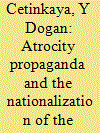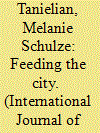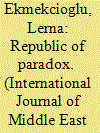|
|
|
Sort Order |
|
|
|
Items / Page
|
|
|
|
|
|
|
| Srl | Item |
| 1 |
ID:
134751


|
|
|
|
|
| Summary/Abstract |
During the Balkan Wars (1912–13), the mobilization of the home front became significant for the belligerent states, which initiated propaganda activities demonizing their enemies and galvanizing the emotions of their publics. This paper explores one type of such mobilization efforts from above, atrocity propaganda, through which states sought to invoke hatred and mobilize public support for war by focusing on the atrocities (mezalim) that their coreligionists had suffered at the hands of enemies. Although the term “atrocity propaganda” has been used exclusively in the context of World War I in the historiography, the practice it describes was effectively utilized during the earlier Balkan Wars. In the Ottoman Empire, both state and civil initiatives played crucial roles in the making of atrocity propaganda, which was disseminated through intense coverage in the Turkish-language press. The imagery it employed shifted with the onset of the wars, becoming increasingly shocking. Atrocity propaganda contributed to the well-known radicalization of nationalism in the late Ottoman Empire.
|
|
|
|
|
|
|
|
|
|
|
|
|
|
|
|
| 2 |
ID:
134632


|
|
|
|
|
| Summary/Abstract |
This article explores the American role in the Syrian political scene in Cairo toward the end of World War I and in its immediate aftermath. It challenges the absence of the United States and of American actors as primary players in much of the historical writing on the Middle East in this period. It illuminates a neglected episode of regional American diplomacy, argues that the United States was not relegated to the periphery in local debates surrounding the dismemberment of Ottoman Syria, and emphasizes the broader uncertainties that characterized the competition for Mandate territories in the Middle East prior to 1920. In doing so, it takes a close look at the long-forgotten reports of William Yale, the U.S. State Department's “Special Agent” in Cairo in late 1917, and situates them within evolving trends in Syrian-Arab politics. Yale, who surfaced in Egypt after serving with Standard Oil in Palestine, was the key Arabic-speaking American “on the spot” and proved to be an astute if imperfect observer of the diversity of Syrian national sentiment. A survey of his reports allows for a new perspective on Cairo's Syrians and their pragmatic and ideological turn toward the United States as World War I unfolded. Alienated from Britain and France, they looked increasingly to the United States, and the appeal of a postwar American trusteeship over Syria gained currency among émigré intellectuals and aspiring powerbrokers.
|
|
|
|
|
|
|
|
|
|
|
|
|
|
|
|
| 3 |
ID:
134750


|
|
|
|
|
| Summary/Abstract |
World War I in the Ottoman Empire was a humanitarian disaster of unprecedented scale. By 1916 in the Greater Syrian provinces, men, women, and children were dying en masse of a war-induced famine so devastating that popular memory still names this war ḥarb al-majāʿa (the war of famine). Despite the civilian catastrophe, people's experiences on the Ottoman home front have been only marginally explored in the scholarship. Focusing on the city of Beirut, this article highlights the centrality of food provisioning in the competition for political legitimacy in the provincial capital. Through a detailed analysis of how the Beirut municipality was represented in the city's daily newspaper al-Ittihad al-ʿUthmani, I argue that for local reform-minded notables and intellectuals the war presented an opportunity to prove, both to the local population and to the Ottoman state, that issues related to the internal security and well-being of the Beirut province generally and the city specifically could be dealt with locally through existing governing bodies. The article thus traces the fierce political games played around the issue of food by various actors seeking to win the hearts of Beirutis through their stomachs.
|
|
|
|
|
|
|
|
|
|
|
|
|
|
|
|
| 4 |
ID:
134747


|
|
|
|
|
| Summary/Abstract |
This article analyzes interviews related to the 1916–19 Sharifian siege of Medina that were published in a collection on the city's history by Saudi Arabian historian Ahmad Murshid. These oral histories narrate how Fakhri Pasha (Turkish: Fahreddin), the Ottoman military commander stationed in Medina during the siege, expelled residents from their homes, strictly controlled the supply of food in the city, and managed military operations out of the Holy Mosque of the Prophet Muhammad. The article seeks to explore the perspective of ordinary civilians who experienced the siege, a perspective largely missing from the literature on the subject. The interviews are positioned here as a valuable historical source for understanding the impact of the siege on these individuals and on their families, communities, and identities. Their memories underscore the interviewees’ deep attachment to their city, as well as to their identity as madanīs and as legitimate narrators of Medina's history.
|
|
|
|
|
|
|
|
|
|
|
|
|
|
|
|
| 5 |
ID:
134628


|
|
|
|
|
| Summary/Abstract |
This article focuses on the years after World War I, especially the first decade following the 1923 establishment of the Republic of Turkey, in order to analyze the position of minorities in the developing “we” of the new nation as projected by its political elite. Situating the discussion in the context of the League of Nations interwar minority protection regime, I demonstrate that the Treaty of Lausanne, which the Ankara government and the Allies signed in July 1923, played an important role in the conflicting treatment that minorities have since received in Turkey. The treaty's minority protection clauses entrenched divisions that had already been formed in the Ottoman Empire during the violence of the preceding decade, including the Armenian genocide. Moreover, reminding Turkish leaders of how 19th-century European imperial powers had used the cause of Ottoman Christians’ suffering as an excuse to infringe on Ottoman sovereignty, these clauses alarmed the Turkish political elite, especially as the “Great Powers” themselves were not bound by such minority protection guarantees. The goal of preventing a repetition of this unbalanced international power dynamic, which, according to the new Turkey's leaders, had led to the demise of the Ottoman Empire, engendered paradoxical policies toward non-Muslim Turkish citizens; they have been largely excluded from a Turkness (Türklük) to which they were sometimes included, even forcibly included.
|
|
|
|
|
|
|
|
|
|
|
|
|
|
|
|
| 6 |
ID:
134748


|
|
|
|
|
| Summary/Abstract |
This article explores the experience of the Great War in Syria and Lebanon with a specific focus on the famine that, combined with other wartime calamities, decimated the civilian population. Using food as its primary register, it looks at a wide range of largely untapped Syrian and Lebanese poems, zajal, plays, novels, memoirs, and histories written over the course of the 20th century, in order to illuminate the experiential dimensions of the civilians’ war and to delineate some of the discourses that structured it. More specifically, it argues that the wartime famine in Syria and Lebanon gave rise to a remembered cuisine of desperation that is deeply informative about the ruptured world of the civilians’ war.
|
|
|
|
|
|
|
|
|
|
|
|
|
|
|
|
|
|
|
|
|